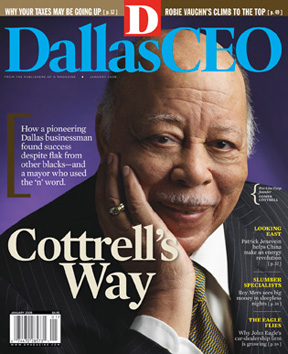Now that the holidays have come and gone, it’s time for the traditional New Year routine: Polish off the leftover turkey and fruitcake, pledge to get off the couch and go to the gym, complain, give up, and return to the couch. It’s the perfect recipe for flabbiness and fatigue. But before you make—and break—the same resolution this New Year, be aware that fitness “resolutions” at the workplace are also good for cutting the fat off the bottom line—and not just in health care costs.
In fact, health care costs are “just the tip of the iceberg,” says Todd Whitthorne, president and COO of Cooper Concepts Inc., a division of the Cooper Aerobics Center in Dallas. “Yes, a good, healthy work force brings the cost of health care down. But more importantly, it makes for more efficient employees.”
A member of Gov. Rick Perry’s Advisory Council on Physical Fitness since 2002, Whitthorne works closely with the center’s founder, Dr. Kenneth Cooper, and specializes in teaching corporate leaders how making wellness a priority will save their companies big bucks. He’s fond of quoting Harvard’s health care policy expert, Dr. Ronald Kessler, who says 60 percent of lost productivity in the workplace is the result of “presenteeism.” The opposite of “absenteeism”—employees missing work—presenteeism is when employees show up to the office but don’t accomplish anything because they don’t feel well. “People are fatigued, stressed at work, they’re a big bag of nothing,” Whitthorne says.
He cites some alarming statistics to illustrate the problem:
›› Fewer than 25 percent of Americans get the minimum prescribed physical activity of 30 minutes a day, most days a week.
›› According to the U.S. Food and Drug Administration’s most recent figures, prescriptions written for antidepressants have gone from 14 million in 1992 to 189 million in 2005. Whitthorne references one company in Dallas where 40 percent of its employees are on antidepressants.
›› This year, the employee share of health care alone will have gone up almost 59 percent since 2003. The United States is ranked first in the world in health care costs but just 42nd for life expectancy.
“It’s a function of lifestyle,” Whitthorne says. “We move too little and eat too much, or [we eat] the wrong things. We have a population that does anything it can to avoid physical activity. But study after study shows that physical movement increases productivity.”
The trick, he says, is for companies to dovetail their wellness programs and benefits packages. The most successful companies offer incentives, including cash, paid time off, or even a cap on an employee’s portion of health care costs for exhibiting healthy behavior. According to the American Journal of Health Promotion, every dollar spent on corporate wellness today will return $3 to $8 within five years. “You have to ask, is there anything in our benefits program that encourages people to be healthy or change their habits?” he says. “As it is now, most employees have their $20 co-pay and everything is taken care of.”
The Cooper Center is working with a number of companies to track their wellness programs for presenteeism, health insurance claims, and productivity. One of those companies is the Dallas office of Ernst & Young LLP. Vice Chair and Southwest Area Managing Partner David Alexander has come to realize the benefits of a company-wide wellness program, saying, “Healthy employees tend to be happier, more productive employees, which benefits our clients, our firm, and most importantly, our people and their families.”
To encourage employees’ healthy living, Ernst & Young offers discounts at health clubs, sporting goods stores, nutritional supply stores, and diet/weight-loss organizations. In addition, each regional office hosts onsite health fairs that offer educational services as well as screenings for blood pressure, cholesterol, and body fat. The firm also pays for comprehensive health examinations for senior-level employees.
Whitthorne emphasizes that in order for these programs to be successful, support must start at the top. “If you want the troops involved, you’ve got to get the general involved,” he says. “Prioritize it, live it, and say, ‘This is critical for our success.’
“The reality is, you can’t afford not to afford corporate wellness,” he continues. “Because, ultimately, the entire bottom line of a company is dependent on a work force that will produce.”
With national health care costs continuing to outpace pay raises each year, he adds, both employees and employers have reason to be proactive about being active.
Crayton Webb is manager of government relations for Mary Kay Inc. Previously, Webb was chief of staff to Dallas Mayor Laura Miller and an investigative reporter for CBS 11.






